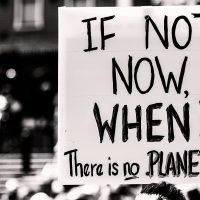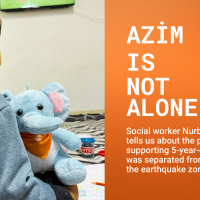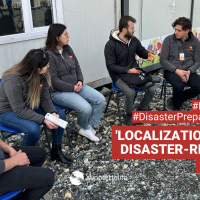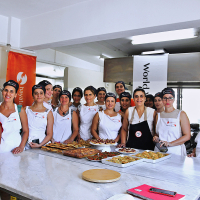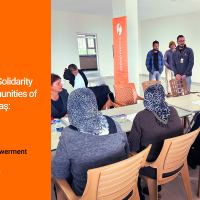Psychologist Yonca Sağaltıcı from Support to Life Istanbul team talks about the impact of the support group work we carry out with women in Istanbul with the testimonies of the women who attended the sessions.
In our project supported by the German Federal Ministry for Economic Cooperation and Development (BMZ) and implemented in cooperation with the German Agency for International Cooperation (GIZ) we both provide mental health and psychosocial support services to beneficiaries and reinforce relevant capacities of local governments.
At Istanbul stage of the project we conduct in cooperation with the metropolitan municipalities in Istanbul and Şanlıurfa, we work with Neighborhood Houses within Metropolitan Municipality Department of Social Services.
Support groups compose of a significant part of the mental health and psychosocial support service we provide to beneficiaries. We carried out our last activity at Sulukule Neighborhood House in Fatih and Zafer Neighborhood House in Yenibosna with 14 female participants with sessions that last for about 3 months. The purpose of these groups is to mobilize and strengthen our clients' inner resources such as coping with stress and resilience. While doing this, we also give them a space of connecting with each other, asking questions, sharing experiences, about the challenges they face. Ayşe, 44, one of the support group participants, said that asking questions helped her get rid of thought patterns:
"Gender roles are thought patterns that have been formed since our childhood, and as we become more conscious, these thought patterns disintegrate. Even though our awareness increases, we can still see the remnants of those fragmentations. Therefore, we need to talk more about gender issues and spread these conversations as widely as possible.”
“Society Fears Strong Women”
Gender equality occupies a significant place in our support group sessions. In our support group, including sessions titled ’Feminist Pedagogy’, ‘Free Labor of Women in Household, Labor Markets, Labor Life and Gender’, ‘Law, Gender, and Violence‘, we observe that as awareness and level of consciousness of women increase, their self-esteem also increase. What the 53-year-old Hayriye says reflects this situation:
’In the geography where I grew up smart and talkative women are feared. Honestly, I thought the same. I learned how to perceive from a different angle after discussing equality in these sessions. And I understood that equality is more comfortable for both sexes.’’
“Both Us and Our Surrounding Gained Consciousness”
During sessions when we also discuss types of violence, we discovered altogether that violence was identified with only physical violence among women while psychological/emotional, economic, digital, and sexual violence were not discussed sufficiently. For instance, the 40-year-old Fatma who was among participants of our support group says: “I discussed the issues we talked about at sessions with my daughter and we became aware of the psychological violence her husband applied on her. Thanks to my conversations with my daughter, my daughter has reached a level where she can stop the violence.”
Ayşe explains how they spread mechanisms to empower themselves as well as those around them:
“Those around us are not sufficiently informed on violence. During these sessions both we gained consciousness and raised consciousness of those around us on this issue. I described the precaution and protection mechanisms we discussed at sessions to my neighbor that I know was a subject of violence. I heard about the KADES application for the first time at these sessions. It is very important to be aware of these mechanisms.’’
“We Are Actually Not Alone”
The responsibilities that society assigns to men and women reveal gender roles. Such roles can be a tool of social pressure on women especially in cases such as divorce. Sevda describes how she took heart from this female solidarity in her own divorce process: “We are actually not alone. There are several women that have the same fight as we do. My belief in achieving things increased as we act together and do not feel isolated.’’
Support group participants come together outside sessions to exchange opinions on issues they need to discuss. They note that they take strength from each other with their stories and experiences.
Our support groups where Turkish and Syrian women participate together act as a social support mechanism, a social cohesion tool. Fatma says, “After every session, we used to have coffee at the house of one of the friends from support group. We continued to see each other after the sessions were completed. We supported our friend who spoke no Turkish in her endeavor to learn Turkish. We call each other almost daily,” and draws attention to this social support.
Activating our inner resources such as coping and endurance is possible sometimes with individual support mechanisms and sometimes with support groups. These women that gain strength by learning from and listening to each other are the biggest proof of this. As Support to Life mental health support team, we continue to support women while building these sharing spaces.
*Names of beneficiaries are changed to protect their privacy.
Yonca Sağaltıcı
Psychologist, Istanbul
Editor: Çiğdem Güner
Communications Manager / Istanbul
Thank you for reading the article and for coming this far. Now you can support life while you are here.



